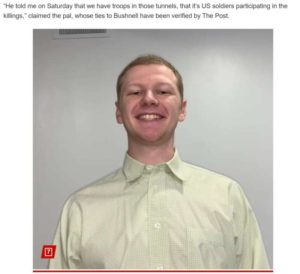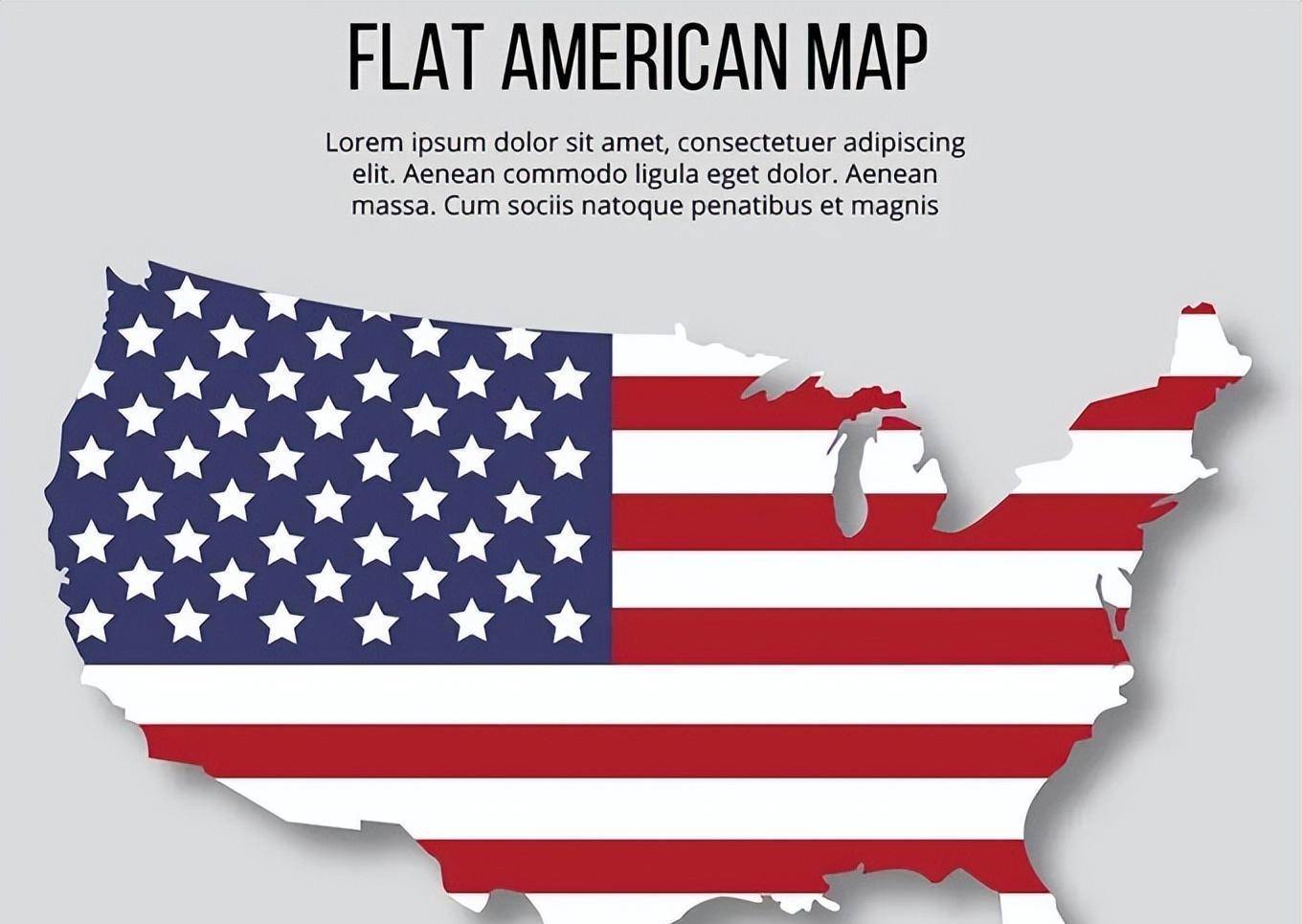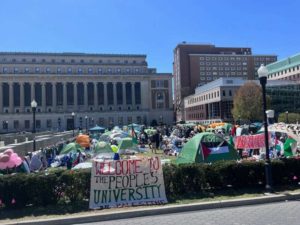Coronavirus: What this crisis reveals about US – and its president
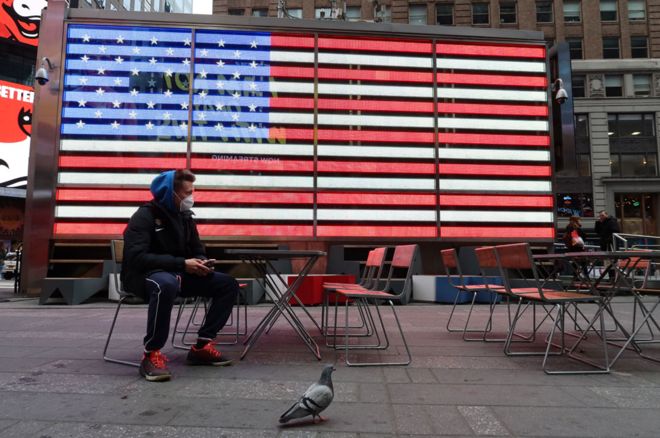
There are no fresh flowers at the 9/11 Memorial any more. An American altar usually decorated with roses, carnations and postcard-sized Stars and Stripes is sequestered behind a makeshift plastic railing. Broadway, the “Great White Way”, is dark. The subway system is a ghost train. Staten Island ferries keep cutting through the choppy waters of New York harbour, passing Lady Liberty on the way in and out of Lower Manhattan, but hardly any passengers are on board. Times Square, normally such a roiling mass, is almost devoid of people.
In the midst of this planetary pandemic, nobody wants to meet any more at the “Crossroads of the World”. A city known for its infectious energy, a city that likes to boast it never even has to sleep, has been forced into hibernation. With more cases than any other American conurbation, this city is once again Ground Zero, a term no New Yorker ever wanted applied here again. With manic suddenness, our world has been turned upside down, just as it was on September 11th.
Nations, like individuals, reveal themselves at times of crisis. In emergencies of this immense magnitude, it soon becomes evident whether a sitting president is equal to the moment. So what have we learnt about the United States as it confronts this national and global catastrophe? Will lawmakers on Capitol Hill, who have been in a form of legislative lockdown for years now, a paralysis borne of partisanship, rise to the challenge? And what of the man who now sits behind the Resolute Desk in the Oval Office, who has cloaked himself in the mantle of “wartime president”?
Of the three questions, the last one is the least interesting, largely because Donald Trump’s response has been so predictable. He has not changed. He has not grown. He has not admitted errors. He has shown little humility.
Instead, all the hallmarks of his presidency have been on agitated display. The ridiculous boasts – he has awarded himself a 10 out of 10 for his handling of the crisis. The politicisation of what should be the apolitical – he toured the Centers for Disease Control wearing a campaign cap emblazoned with the slogan “Keep America Great”.
The mind-bending truth-twisting – he now claims to have fully appreciated the scale of the pandemic early on, despite dismissing and downplaying the threat for weeks. The attacks on the “fake news” media, including a particularly vicious assault on a White House reporter who asked what was his message to frightened Americans: “I tell them you are a terrible reporter.” His pettiness and peevishness – mocking Senator Mitt Romney, the only Republican who voted at the end of the impeachment trial for his removal from office, for going into isolation.
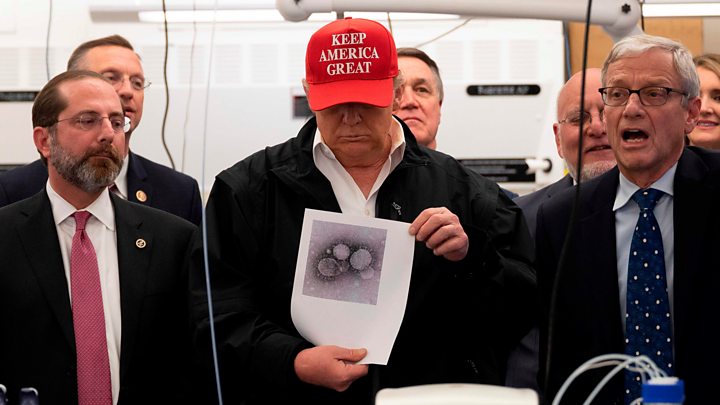
His continued attacks on government institutions in the forefront of confronting the crisis – “the Deep State Department” is how he described the State Department from his presidential podium the morning after it issued its most extreme travel advisory urging Americans to refrain from all international travel. His obsession with ratings, or in this instance, confirmed case numbers – he stopped a cruise ship docking on the West Coast, noting: “I like the numbers where they are. I don’t need to have the numbers double because of one ship that wasn’t our fault.” His compulsion for hype – declaring the combination of hydroxycholoroquine and azithromycin “one of the biggest game-changers in the history of medicine,” even as medical officials warn against offering false hope.
His lack of empathy. Rather than soothing words for relatives of those who have died, or words of encouragement and appreciation for those in the medical trenches, Trump’s daily White House briefings commonly start with a shower of self-congratulation. After Trump has spoken, Mike Pence, his loyal deputy, usually delivers a paean of praise to the president in that Pyongyang-on-the-Potomac style he has perfected over the past three years. Trump’s narcissistic hunger for adoration seems impossible to sate. Instead of a wartime president, he has sounded at times like a sun king.
Then there is the xenophobia that has always been the sine qua non of his political business model – repeatedly he describes the disease as the “Chinese virus”. Just as he scapegoated China and Mexican immigrants for decimating America’s industrial heartland ahead of the 2016 presidential election, he is blaming Beijing for the coronavirus outbreak in an attempt to win re-election.
His attempt at economic stewardship has been more convincing than his mastery of public health. A lesson from financial shocks of the past, most notably the meltdown in 2008, is to “go big” early on. That he has tried to do. But here, as well, there are shades of his showman self. He seems to have rounded on the initial figure of a trillion dollars for the stimulus package because it sounds like such a gargantuan number – a fiscal eighth wonder of the world.
Trump, in common with all populists and demagogues, favours simple solutions to complex problems. He closed America’s border to those who had travelled to China, a sensible move in hindsight. However, the coronavirus outbreak has required the kind of multi-pronged approach and long-term thinking that seems beyond him. This has always been a presidency of the here and now. It is not well equipped to deal with a public health and economic emergency that will dominate the rest of his presidency, whether he only gets to spend the next 10 months in the White House or another five years.
The Trump presidency has so often been about creating favourable optics even in the absence of real progress – his nuclear summitry with the North Korean despot Kim Jong-un offers a case in point. But the tricks of an illusionist, or the marketing skills of the sloganeer, do not work here. This is a national emergency, as countless others have pointed out, that can’t be tweeted, nicknamed or hyped away. The facts are inescapable: the soaring numbers of the dead.

What have we learnt of the United States? First of all, we have seen the enduring goodness of this country. The Frenchman Alexis DeToqueville, whose observations in the early-19th Century did so much to demystify this rambunctious new republic, always told us: “America is great because she is good.”
As with 9/11, we have marvelled at the selflessness and bravery of its first responders – the nurses, doctors, medical support staff and ambulance drivers who have turned up to the work with the same sense of public spiritedness shown by the firefighters who rushed towards the flaming Twin Towers. We’ve witnessed the ingenuity and creativity of schools that have transitioned to remote, online teaching without missing a beat. We’ve seen a can-do spirit that has kept stores open, shelves stocked and food being delivered. In other words, most Americans have shown precisely the same virtues we have seen in every country brought to a halt by the virus.
As for the American exceptionalism on display, much of it has been of the negative kind that makes it hard not to put head in hands. The lines outside gun stores. The spike in online sales of firearms – Ammo.com has seen a 70% increase in sales. The panic buying of AR-15s. Some Christian fundamentalists have rejected the epidemiology of this pandemic. To prove there was no virus, a pastor in Arkansas boasted his parishioners were prepared to lick the floor of his church.
Once again, those who live in developed nations have been left to ponder why the world’s richest country does not have a system of universal healthcare. Ten years after the passage of Obamacare, more than 26 million Americans do not have health insurance.
Rather than a coming together, the crisis has demonstrated how for decades Americans have conducted a political version of social distancing: the herd-like clustering of conservatives and liberals into like-minded communities caused by the allergic reaction to compatriots holding opposing political views. Once again, we have seen the familiar two Americas divide, the usual knee-jerk tribalism. Republicans have been twice as likely as Democrats to view coronavirus coverage as exaggerated. Three-quarters of Republicans say they trust the information coming from the president, whereas the figure among Democrats is just 8%.
As the Reverend Josh King told the Washington Post despairingly: “In your more politically conservative regions, closing is not interpreted as caring for you. It’s interpreted as liberalism.” Even on 13 March, when the CDC projected that up to 214 millions could be infected, Sean Davis, the co-founder of the right-wing website, The Federalist, tweeted: “Corporate political media hate you, they hate the country, and they will stop at nothing to reclaim power to rule over you. If that means destroying the economy via a panic they helped incite, all while running interference for the communist country that started it, so be it.”
The latest Gallup polling shows the split: 94% of Republicans approve of his handling of the crisis, compared with 27% of Democrats. But overall, six out of ten Americans approve, pushing his approval rating up again to 49%, matching the highest score of his presidency. As with previous crises, such as 9/11, Americans tend to rally around the presidency, although Donald Trump remains a deeply polarising figure. After the attacks of September 11th, George W Bush’s approval rating was over 90.
![]()


